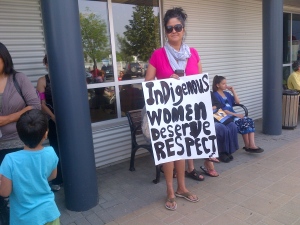Event highlights issue of missing and murdered Aboriginal women

Source: CBC News
Saskatoon’s police chief and the chief of the Montreal Lake Cree Nation led a march in support of Marlene Bird this morning.
Bird is the homeless woman who was brutally attacked last month in Prince Albert. She has been receiving treatment at a hospital in Edmonton and was set to arrive in Saskatoon Wednesday for further treatment at a hospital in her home province.
About 70 people joined in the Saskatoon walk.
DeeAnn Mercier was among them. She works at the Lighthouse shelter and said homeless people are often victims of random attacks.
“Our mobile outreach team was out last night and picked an individual up who had been urinated on and someone had stolen his pants,” Mercier said. “It’s just so humiliating for folks.”
Mercier said fortunately that person was physically unhurt, but she worries that other Lighthouse clients may not be so lucky.
Part of the aim of today’s walk is to spur more donations for Bird’s care after she is released from hospital, said Eldon Henderson, one of the event’s organizers.
“She’s going to need a home… and wheelchair accessibility,” Henderson explained.
Two fundraising efforts are underway, including one by the Prince Albert YWCA. The Montreal Cree Nation has also set up a trust account at the Royal Bank.
By Henderson’s estimate about $13,000 had been raised as of the start of Wednesday morning. He was unable to say at this point how much more money is needed.
Meanwhile, Montreal Lake is focusing more attention on the wider issue of missing and murdered Aboriginal women. It’s co-hosting the 1st Annual Canadian Indigenous Women Conference this November in Saskatoon.
In August the community will begin raising money to establish a Foundation for Aboriginal Women in Canada. It will offer help to the survivors of missing and murdered Aboriginal women.
“We want to make sure that we have the expertise and the staff there that’s going to complement that healing process for the families,” Henderson said.
It’s hoped the foundation will also have a scholarship program.
